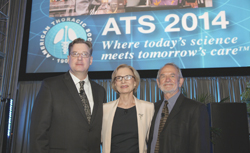
ATS President-elect Thomas Ferkol (left), President Patricia Finn, and Philip Hopewell speak at Opening Ceremony.
When Patricia W. Finn, MD, became ATS president a year ago, she called for the Society to step up its efforts to reduce health care disparities. During the ATS 2014 Opening Ceremony on Saturday, Dr. Finn reflected on the progress that has been made throughout the Society.
“The goal was to define, embed, and embrace health equality in a sustainable model so it wouldn’t be just a one-year idea,” Dr. Finn says. “How could we really address it and make a difference, raising awareness that involves science and investigation?”
The Health Equality Subcommittee, which was established to facilitate these efforts, has set four priorities: educate and advocate against e-cigarette access for children with the hope of protecting the right of all people to breathe clean air; foster diversity of the workforce, in collaboration with the Health Policy Committee; advocate for Medicaid expansion and implementation of the Affordable Care Act; publish an annual or semiannual report on lung health in vulnerable populations.
“This wasn’t something that was just thought up by an executive committee somewhere,” Dr. Finn says. “It is each and every one of you that are doing some aspect of this. There are young new folks coming in who really do want to change the world, and it is our job to help them and not get in their way.”
Also during the Opening Ceremony, Philip Hopewell, MD, an ATS past president, reported on the publication of the newest edition of the International Standards for Tuberculosis Care, which was released in March.
The handbook describes a level of tuberculosis care that all practitioners should seek to achieve. It was produced to unify approaches to diagnosis, treatment, and prevention among all sectors, says Dr. Hopewell, who is co-chair of a steering committee that includes more than 60 members from several international organizations that updated the publication.
The greatest challenge is in the private sector, because data for about 3 million cases of tuberculosis treated between 1990 and 2012 are missing, Dr. Hopewell says. Medical societies are the key to getting more information about all cases of the disease, he adds.
“In many places, professional societies are the only way of accessing private physicians,” Dr. Hopewell says. “Societies can give credibility to programs.”
ATS President-elect Thomas W. Ferkol, MD, who is preparing to lead the Society for 2014-15, expressed optimism about the role of the ATS in improving the diagnosis and treatment of lung disease.
“With discoveries from the bench increasingly applied to diagnostics and patient care, there is a critical need for pulmonary scientists and clinical investigators,” he says. “We need to encourage and channel the passion and talents of our members who advocate for better global lung health and enhancing the lives of the people we treat.”
Also during the ceremony, Dr. Finn presented the new Awards for Innovations in Health Equality to representatives from programs that address asthma and Hermansky-Pudlak syndrome in underserved communities. Lynn B. Gerald, PhD, MSPH, the Canyon Ranch Endowed Chair, professor in the Department of Health Promotion Sciences, and associate dean of research in College of Public Health at the University of Arizona, and her team received an award. Donna Appell, RN, and her daughter, Ashley, of the Hermansky-Pudlak Syndrome Network, Inc., also received an award.
